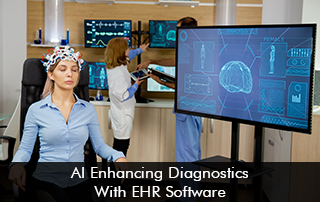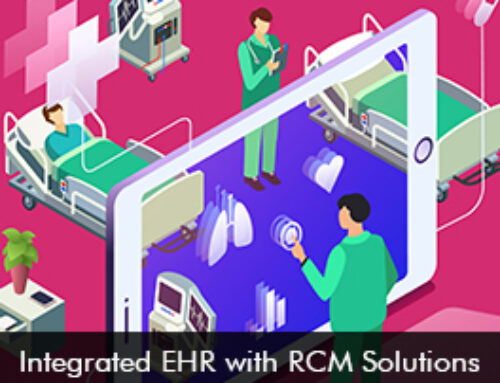The integration of Artificial Intelligence (AI) is enhancing diagnostics with EHR software. AI-powered algorithms and machine learning models assist healthcare providers in making more accurate and timely diagnoses. We explore this impact on healthcare in our blog.
Data Analysis and Pattern Recognition Enhancing Diagnostic With EHR Software
One of the key advantages of AI in EMR software is its ability to analyze vast amounts of patient data and recognize patterns that might not be immediately apparent. AI algorithms can identify trends and anomalies by analyzing:
- Electronic health records
- Laboratory results
- Medical images
- Other relevant data
AI-powered algorithms can process large datasets quickly saving time and effort. It is also a powerful tool for comparing patient information against vast databases of medical knowledge, providing healthcare providers with valuable insights and potential diagnoses.
This data-driven approach can help reduce diagnostic errors and improve accuracy by considering a broader range of factors and rare conditions that may mimic more common diseases.
Decision Support Systems
AI integrated into EMR software can serve as a powerful decision support system. It assists healthcare providers in making informed decisions based on evidence-based guidelines and the latest medical research. These systems can analyze a lot of data in no time and provide real-time recommendations for diagnostic tests, treatment options, and medication choices.
By leveraging AI-driven decision support systems, healthcare providers can access up-to-date information and gain insights into potential diagnoses, treatment plans, and drug interactions or contraindications. This not only improves the accuracy of diagnoses but also helps healthcare professionals stay informed about the latest advancements in their field.
Image Analysis and Radiology Enhancing Diagnostics With EHR Software
AI algorithms have shown remarkable potential in analyzing medical images, such as X-rays, CT scans, and MRIs. It is able to detect abnormalities and assist radiologists in making accurate diagnoses. By training machine learning models on large datasets of labeled images, AI can learn to identify patterns and anomalies that may indicate the presence of diseases or conditions.
AI-powered image analysis tools integrated into EMR software can:
- Highlight areas of interest
- Provide automated measurements
- Assist in the detection of subtle changes
- Detect abnormalities that might be missed by human observers
This not only improves the efficiency of radiology workflows but also enhances the accuracy and speed of diagnoses.
Predictive Analytics and Early Detection
Another significant benefit of AI in EMR software is its ability to perform predictive analytics and aid in early disease detection. By continuously monitoring patient data, AI algorithms can identify patterns or changes that may indicate the risk of developing certain conditions or diseases. This proactive approach allows healthcare providers to intervene earlier, potentially leading to more successful treatment outcomes.
For example, AI algorithms can analyze patient data, such as vital signs, laboratory results, and patient history, to identify individuals at risk of developing conditions like sepsis, heart disease, or diabetes. Early detection through AI-powered predictive analytics can prompt timely interventions and preventive measures, ultimately improving patient outcomes and reducing healthcare costs.







